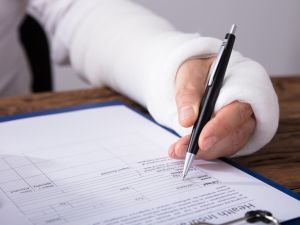
Accidents happen and resulting injuries occur. But who is responsible when it happens on someone’s property?
Owners of Wisconsin businesses, residences, apartment complexes and other properties have a responsibility to keep their aisles, stairs and walkways free of any transitory foreign substance that might cause invitees to slip and fall. That may include promptly addressing items such as ice and snow that has accumulated and promptly cleaning up spills.
Unfortunately, many property owners lapse in this duty of care, and there are numerous loopholes in the law that can make obtaining compensation tricky.
The National Floor Safety Institute reports there are an estimated 1 million slip-and-falls annually that require hospital emergency room treatment. They are the leading cause of workers’ compensation claims.
Property owners have a responsibility to maintain a relatively safe environment so that people who come onto the property do not suffer an injury. This is known as "premises liability," which states property owners and residents liable for accidents and injuries that occur on their property.
 Types Of Slip-And-Fall Injuries
Types Of Slip-And-Fall Injuries
Some of the injuries treated in hospital emergency rooms following a slip-and-fall may include:
· Cuts and abrasions
· Broken bones
· Head injuries.
· Spinal cord injuries
Even a seemingly “minor” slip-and-fall injury can leave you grappling with pain and difficulty at work or caring for your family for weeks or months on end. You should not have to cover the cost of those expenses when the catalyst for your fall was negligence on the part of the property owner.
Slip-And-Fall Liability
Like many other personal injury cases, premises liability depends on whether we can prove fault and damages. Negligence is the theory on which these cases hinge. That is:
· Did the property owner owe a duty of care to plaintiff?
· Did property owner breach that duty?
· Did the breach of duty cause plaintiff’s injuries?
· Did plaintiff suffer monetary damages as a result of those injuries?
Under Wisconsin law, you only have three years from the date of injury to bring your claim.
The most difficult element to prove in a premises liability case is that the owner knew, or should have known, of the dangerous condition that caused your injury.
It is important to note that the homeowner may argue that you were either fully or partially responsible for your injuries ( known as contributory negligence). Contributory negligence occurs when you are found to have been over 51 percent liable for your own injuries; if this is found to be the case, you will be barred from recovering anything from the homeowner.
If you were the victim of a slip and fall you should call an experienced attorney who will help you understand your legal rights. Please contact us today to set up a free consultation. Please contact us by text or phone at (414) 775-7445 or email at laura@jlfwisconsin.com anytime.
*Any articles in the Libra or posted by Jones Law Firm LLC are not legal advice for a particular client or situation. Further no attorney-client relationship is intended or created with this post.*

